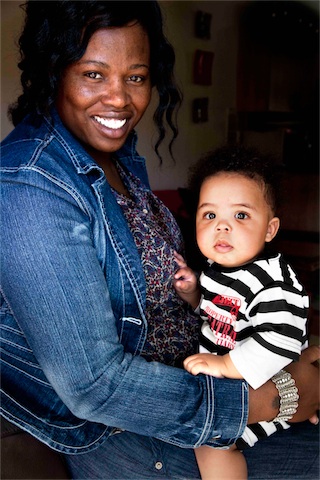
EGPAF Ambassador Florence Ngobeni-Allen and her son Kulani. (photo: Florence Ngobeni-Allen / EGPAF)
As a mother, wife and health counselor living with HIV in South Africa, I know about the fears that a woman can feel when she thinks about disclosing her HIV status to loved ones. When I discovered that I was living with HIV, I feared stigma on top of the hardship of being diagnosed with an incurable virus.
But, through the pain, I came to see some benefits of disclosure — and even the joy. I did face some rejection from people who did not understand HIV and judged me for my illness; but many close friends and family members gave me love and support during times when I felt most devastated.
In 1997, I lost my husband and five-month-old daughter to AIDS-related illnesses. Those deaths broke my heart. After disclosing my HIV status to my remaining loved ones, I followed my antiretroviral treatment consistently, without fear of being found out. Eventually, I met a man who accepted me as I am, and we have had two sons together. Both children are HIV-free because of my commitment to following a prevention of mother-to-child transmission of HIV (PMTCT) regimen.
My experience living with HIV provides the backbone of my work as a health counselor and as an ambassador for the Elizabeth Glaser Pediatric AIDS Foundation (EGPAF). I encourage HIV-positive mothers to disclose their status to family and friends, many of whom will be supportive. I know that telling other people that you are HIV-positive can by stressful, particularly for a woman telling a romantic partner or children.
Stigma and discrimination are often in the back of a woman’s mind when she is being tested for HIV. She fears being judged and rejected. That’s why HIV counseling is so important. I talk to my clients to help them choose when and how to disclose their status. Some of my most challenging counseling sessions involve discordant couples, meaning that one partner is HIV-positive, while the other is not. In these cases, blame and mistrust could jeopardize the relationship. The HIV-positive partner risks losing the very support that she needs.
As a counselor, I help my clients realize that they can still find support and can live healthy lives, despite HIV. I tell them about the deep sadness a carry because of the death of my daughter — as well as the deep joy I feel as I watch my boys grow up.
Mother’s Day is an occasion to express solidarity with the mothers who have lost children to the HIV epidemic and who are raising children living with HIV. And it is a day to celebrate with the HIV-positive women who were able to have HIV-free children. It is a day to accept and support all mothers and commit ourselves to fighting the continuing stigma that can make disclosure so hard.
By Florence Ngobeni-Allen | April 28, 2015
Source: Elizabeth Glaser Pediatric AIDS Foundation
